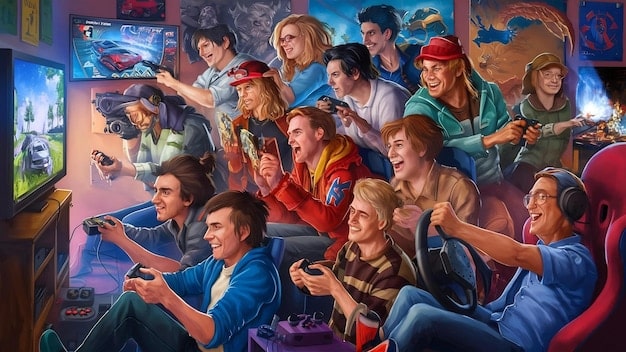The Future of Fandom: AI’s Impact on US Fan Communities

The future of fandom in the US is being significantly reshaped by artificial intelligence (AI), influencing content creation, community engagement, and fan experiences, leading to both exciting opportunities and potential challenges.
The landscape of fandom in the United States is undergoing a dramatic transformation. Artificial intelligence (AI) is no longer a futuristic concept; it’s actively reshaping how fans create, connect, and experience their favorite pop culture obsessions. The future of fandom: how AI is shaping fan communities in the US is a topic ripe with both excitement and concern.
Understanding AI’s Role in Shaping Fandom
AI’s integration into fan communities isn’t just about chatbots and personalized recommendations. It’s about fundamentally changing how content is produced, distributed, and consumed. This shift presents both opportunities and challenges for creators, platforms, and fans alike.
Content Creation and AI
AI tools can assist fans in creating fan fiction, artwork, music, and videos, often with remarkable efficiency. This democratization of content creation empowers more fans to participate actively in their fandoms.
AI-Powered Recommendations
Streaming services and social media platforms use AI algorithms to suggest content tailored to individual fan preferences, creating personalized experiences and potentially leading fans to discover new interests.

Here are some aspects of content generation within AI and fandom:
- AI can generate personalized avatars and virtual companions.
- Tools can help translate text to various languages, assisting global fan communication.
- AI assists moderators in finding potentially harmful content to remove.
In conclusion, AI presents interesting perspectives for content generation, personalization, and community moderation within fandom.
The Rise of AI-Generated Fan Content
One of the most visible impacts of AI on fandom is the emergence of AI-generated content. From deepfake videos to AI-assisted fan fiction, the possibilities seem endless, raising questions about authenticity, copyright, and the very nature of creativity.
Advancements in machine learning have equipped fans with sophisticated tools to create content previously out of reach for many. This has led to a surge in diverse and innovative fan works, pushing the boundaries of what’s possible.
Deepfakes and Visual Content
AI-powered deepfake technology allows fans to seamlessly insert characters into scenes, create alternate endings, or even resurrect beloved actors in new roles. While impressive, these deepfakes also spark ethical debates regarding consent and representation.
AI-Assisted Fan Fiction
AI writing tools can provide inspiration, generate plot ideas, or even write entire sections of fan fiction based on user prompts. This collaborative approach blurs the lines between human and machine creativity.

Below are more detailed aspects of content within AI and fandom:
- AI music composition tools enable fans to create original soundtracks and remixes.
- AI image generation results in new forms of art.
- AI voice cloning lets users “revive” characters.
- Creative experimentation now finds itself widely supported due to AI.
In conclusion, AI-assisted and AI-generated works present both promise and concern for the future of fandom and digital creation.
AI-Enhanced Fan Experiences: Personalization and Immersion
AI algorithms are adept at analyzing vast amounts of data to personalize fan experiences. From curated content feeds to interactive storylines, AI can tailor every aspect of fandom to individual preferences.
Imagine a world where you can interact with your favorite characters in real-time through AI-powered chatbots, or explore immersive virtual environments based on beloved franchises. AI is making these possibilities a reality, creating richer and more engaging fan experiences.
Interactive Storytelling
AI can create dynamic storylines that adapt to user choices, allowing fans to actively shape the narrative. This offers a new level of immersion and agency within fictional worlds.
Virtual Reality and Immersive Environments
VR experiences powered by AI can transport fans to their favorite fictional settings, allowing them to explore iconic locations and interact with characters in a highly realistic manner.
AI has also changed:
- Dynamic event scheduling for fan meetups.
- “Smart” merchandise that interacts with the user
- Unique and novel ways to explore the fan-favorite universes.
Overall, these perspectives make AI an interesting source for the next phases of fan interaction.
The Ethical Concerns: Copyright, Authenticity, and Bias
While AI offers immense potential, it also raises a number of ethical concerns within fan communities. Copyright infringement, the blurring of authenticity, and potential algorithmic bias are just a few of the challenges that need to be addressed.
AI algorithms are trained on massive datasets, often containing copyrighted material. This raises questions about the legality of AI-generated content that closely resembles existing works. Similarly, the ease with which AI can mimic human creativity can lead to concerns about the authenticity of fan creations, and questions of ownership need to be addressed.
Copyright and Intellectual Property
The use of copyrighted material to train AI algorithms raises complex legal questions about fair use and intellectual property rights.
Authenticity and Human Creativity
The rise of AI-generated content can challenge the notion of human creativity and authorship, leading to debates about what constitutes “true” fan work.
Considerations that now come to question include:
- The potential for AI algorithms to perpetuate societal biases, potentially leading to unfair or discriminatory outcomes within fan communities.
- The ethical responsibility of AI developers and platform providers to ensure that their tools are used responsibly and ethically within fandom spaces.
As such, there are many things to consider from the ethical standpoint of AI and fandom.
Combating Misinformation and Deepfakes in Fandom
The spread of misinformation and deepfakes poses a serious threat to fan communities. AI itself can be used to combat these issues, but a multi-pronged approach involving education, fact-checking, and platform moderation is essential.
AI’s ability to generate realistic fake content makes it increasingly difficult to discern truth from fiction. This can lead to the spread of harmful rumors, the manipulation of public opinion, and even the harassment of individuals within fandom spaces. However, progress can be made with critical analysis.
AI-Powered Fact-Checking Tools
AI algorithms can be used to automatically identify and flag potentially misleading or false information circulating within fan communities.
Watermarking and Authentication Technologies
Digital watermarks and authentication technologies can help verify the origin and authenticity of fan-created content, making it easier to identify deepfakes and other forms of manipulated media.
Platforms are now working to implement:
- Stricter content moderation guidelines to remove harmful or misleading content.
- Educational campaigns that promote media literacy and critical thinking among fans.
In summary, there are various approaches to help reduce misinformation and the spread of deepfakes.
The Evolving Role of Fan Moderators in the Age of AI
Fan moderators play a crucial role in maintaining the health and safety of online communities. As AI becomes more prevalent, their role is evolving to encompass both human oversight and collaboration with AI-powered tools.
AI can assist moderators by automating tasks such as content filtering, spam detection, and the identification of abusive behavior. However, human moderators are still needed to provide nuanced judgment, address complex situations, and foster a sense of community.
AI-Assisted Content Moderation
AI algorithms can automatically flag potentially offensive, harmful, or policy-violating content for review by human moderators.
Community Management and Engagement
Human moderators are still essential for building relationships, fostering discussions, and creating a welcoming environment for all fans.
Now, there are new implementations such as:
- Training for moderators to effectively use AI tools and interpret their outputs.
- Clear guidelines and protocols for addressing AI-flagged content.
- Strong communication channels between moderators and the wider fan community to address concerns and gather feedback.
As such, this should help ease the load that community moderators take on.
The Future of Fan Interaction: AI Companions and Virtual Characters
The future of fandom may involve interacting with AI-powered virtual characters who can provide companionship, entertainment, and personalized experiences. These AI companions could become integral members of fan communities, blurring the lines between fiction and reality.
Imagine having a virtual version of your favorite character that you can chat with, ask questions, and even collaborate with on creative projects. These AI companions could offer a new level of engagement and connection for fans, fostering a sense of belonging and shared experience.
AI-Powered Chatbots and Virtual Assistants
Fans can interact with AI chatbots designed to mimic the personalities and knowledge of their favorite characters.
Personalized Storytelling and Role-Playing
AI can create customized storylines and role-playing scenarios based on user preferences, offering a unique and immersive fan experience.
And, of course, it’s easy to forget the possibility of:
- Concerns about emotional attachment to virtual characters and the potential for blurring the lines between fantasy and reality.
- The need for ethical guidelines and safety measures to protect users from manipulation, exploitation, or harmful interactions with AI companions.
These are just a few of the considerations that can be made for the future evolution of AI companionship.
| Key Point | Brief Description |
|---|---|
| 🤖 AI Content Generation | AI assists in creating fan fiction, art, and music. |
| ✨ Enhanced Fan Experience | AI personalizes content feeds and interactive storytelling. |
| ⚠️ Ethical Concerns | Copyright issues, authenticity, and potential bias. |
| 🛡️ Combating Misinformation | AI helps in fact-checking and identifying deepfakes. |
FAQ
▼
AI enables the creation of fan fiction, artwork, and music with greater efficiency. It democratizes content creation, allowing more fans to actively participate and contribute to their fandoms.
▼
Ethical considerations include copyright infringement, as AI is trained on copyrighted material. There are concerns about authenticity, as AI blurs the lines between human and AI creativity in authorship.
▼
AI algorithms analyze large data sets to customize fan experiences. It provides curated content feeds and interactive storylines that adapt to the individual fan’s preferences, enhancing immersion and engagement.
▼
AI-powered tools can identify and flag misleading information. Watermarking and authentication technologies verify content authenticity, reducing the impact of deepfakes and manipulated content.
▼
Fan moderators oversee AI-powered content moderation. They manage communities, engage with members, and use AI tools effectively, balancing automated processes with human insight for nuanced community management.
Conclusion
As AI continues to evolve, its impact will only deepen, creating new opportunities and challenges for creators and fans alike. Navigating these changes will require careful consideration of ethical implications, a focus on fostering genuine human connection, and a willingness to embrace new forms of creative expression. The future of fandom: how AI is shaping fan communities in the US is a story that’s still being written, and its ultimate outcome depends on the choices we make today.





